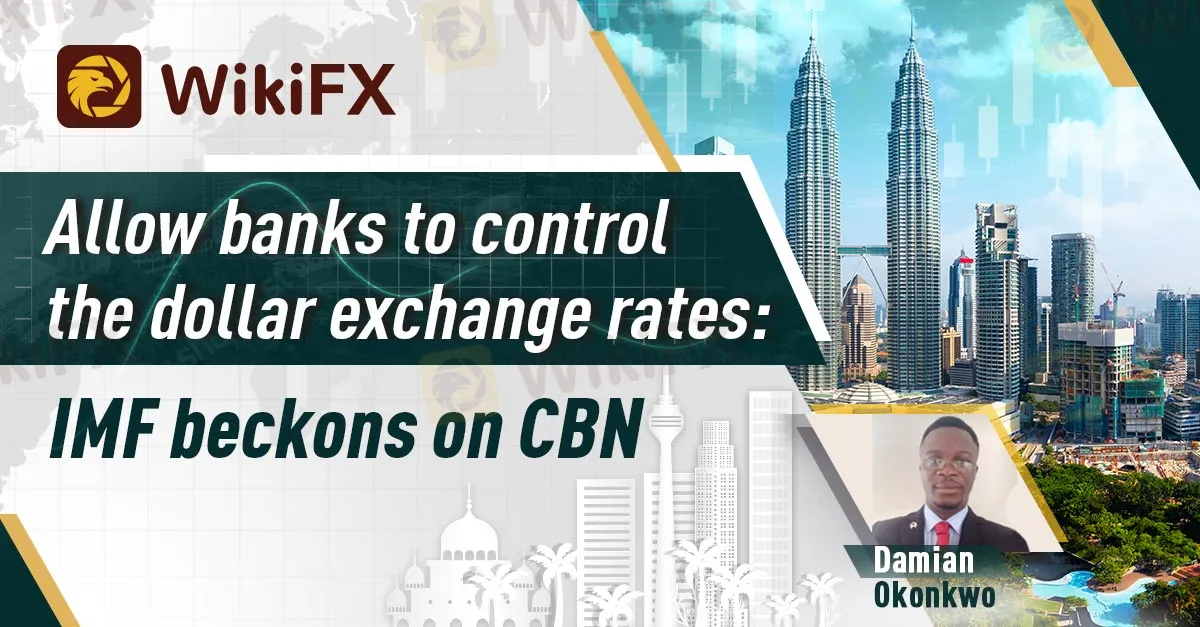Inside the Elite Committee: Talk with Tom
Join forex expert Tom as he shares his journey, trading wisdom, and thoughts on AI and the future of forex in WikiFX’s inspiring “Inside the Elite” interview.
简体中文
繁體中文
English
Pусский
日本語
ภาษาไทย
Tiếng Việt
Bahasa Indonesia
Español
हिन्दी
Filippiiniläinen
Français
Deutsch
Português
Türkçe
한국어
العربية
Abstract:The International Monetary Fund (IMF) has called on the Central Bank of Nigeria (CBN) to re-examine its foreign exchange (FX) management policy which allowed the apex banks to control the dollar exchange rates within the country. They considered this as limiting the market volatility by preventing the commercial banks to freely determine Fx buy-sell rates in the I&E windows.

By: Damian Okonkwo

The International Monetary Fund (IMF) has called on the Central Bank of Nigeria (CBN) to re-examine its foreign exchange (FX) management policy which allowed the apex banks to control the dollar exchange rates within the country. This had left the commercial banks sourcing to obtain dollars for their clients.
Addressing the present FX crisis in Nigeria in its 2022 Article IV Consultation presented during its official visit to the country, the IMF called on the CBN to allow the commercial banks to control the dollar exchange rates including the buy-sell prices as this will help reduce the dollar scarcity and improve the FX supply in the market. According to the IMF:
“In the medium term, the CBN should step back from its role as main forex intermediator, limiting interventions to smoothing market volatility and allowing banks to freely determine forex buy-sell rates.”
Thus, the IMF believed that allowing commercial banks to control the exchange rate will further increase the FX inflow into the country.
Speaking further on this, the IMF explained that the banks maintaining a uniform and market-clearing FX exchange rate is very necessary for boosting foreign investors' confidence in the economy.
Nonetheless, IMF stated that the continued present FX shortage, and practice of maintaining a stable exchange rate by the CBN amidst a weak Naira due to high inflation and limited debt servicing policies will all the more trigger fears of more future devaluation for the Naira amongst investors.
Describing this, the IMF stated that “These factors hinder much-needed capital inflows, encourage outflows, and constrain private sector investment.”
Above all, the body advised the Nigerian government to consider reducing its tax rate to fair levels at par with the standards of the Economic Community of West African States (ECOWAS).

Disclaimer:
The views in this article only represent the author's personal views, and do not constitute investment advice on this platform. This platform does not guarantee the accuracy, completeness and timeliness of the information in the article, and will not be liable for any loss caused by the use of or reliance on the information in the article.

Join forex expert Tom as he shares his journey, trading wisdom, and thoughts on AI and the future of forex in WikiFX’s inspiring “Inside the Elite” interview.

Ho Chi Minh City, Vietnam – The WikiFX Elite Club recently concluded a successful offline pickleball networking event, “Elite Gathering Day · Vietnam: Rally for Connection, Rally for Healthy Development.” The event drew over 50 local industry participants, including prominent Introducing Brokers (IBs), Key Opinion Leaders (KOLs), and representatives from multiple trading firms. This unique gathering seamlessly blended sporting energy with high-value professional networking.

WikiFX is launching the "Safe Trade with WikiFX" exclusive interview series, featuring members of the WikiFX Elite Club. This series delivers in-depth industry insights on trading safety, the establishment of industry standards, and regional market dynamics, aiming to foster deeper understanding of local markets and jointly advance transparency across the industry.

Leading online trading platform Capital.com has announced a new platinum sponsorship agreement with Cypriot NASCAR Euro Series driver Vladimiros Tziortzis, strengthening its commitment to supporting local talent and international motorsport.
